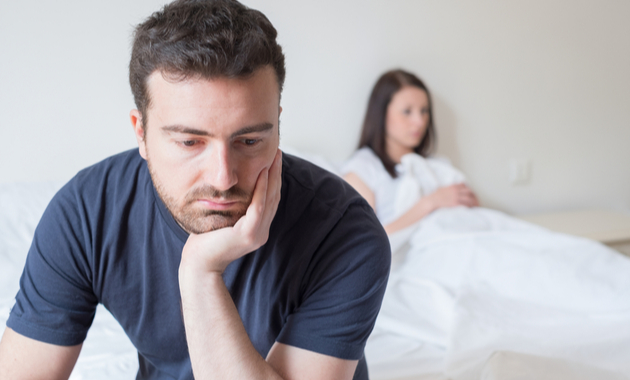
Sexual performance anxiety, simply put as anxiety during/before sexual activity, is one of the most common sexual problems across the world that affects both men and women1,2. According to a study, sexual performance anxiety affects around 9-25% of men and 6-16% of women1. The condition is responsible for premature ejaculation and erectile dysfunction in men and severely affects sex drive in women. Let’s know more about this condition.
What Is Sexual Performance Anxiety (SPA)?
Sexual performance anxiety refers to the fear that an individual goes through when he/she fails to meet his/her partner’s expectation in bed3. Moreover, the anxiety related to sexual performance or relationship problems (such as sexual intimacy or partner rejection) is also responsible for avoidance of sex in couples2. In the worst-case scenario, this anxiety can cause panic disorder2.
Some of the common situations/conditions in which a person suffers from performance anxiety and shies away from engaging in sexual activity are3,4:
– Body image issues related to self/partner
– Masculinity/femininity of an individual
– Partner’s response during the act
– Being belittled about sexual performance
– Partner’s comments on the size/width of the penis
– Partner being shy during the act
– Partner does not reciprocate sexual interest/desire
– Partner takes upper hand during a powerplay
– Partner suffering from any chronic illness
These issues can lead to sexual anxiety and may disrupt the normal sexual response, which in turn can cause dissatisfying sexual experience with the partner3.
What Happens In Sexual Performance Anxiety (SPA)?
Usually, a sexual response, which includes erection, lubrication, orgasm, ejaculation, involve the autonomic nervous (internal) system and thus are not strictly under voluntary control3. When a person experiences a high level of anxiety, it may hinder the normal process of erection3. For example, anxiety can lead to elevated flight and fight response and increase the release of cortisol (stress hormone)3. This is known to cause low erectile response and greater worry. This is the reason why people with performance anxiety tend to experience psychogenic erectile dysfunction or premature ejaculation3,4.
As men take an active and positive role in sexual performance, any failure during the act tends to negatively impact them and cause them to lose confidence/self-esteem4. So during subsequent sexual encounters, there is a high chance that their mind and body may automatically think about the failed attempts before (which could be the inability to achieve an erection, premature ejaculation, delayed ejaculation, or arousal), leading to performance anxiety4. Failure in subsequent acts may aggravate performance anxiety, which can become a vicious cycle4.
Can Sexual Performance Anxiety Be Treated?
Although there have been many cases of sexual performance anxiety, there is yet no diagnosis available for the condition1. This is why there are very few research studies done on the treatment approach for SPA. However, a recent study showed that cognitive behavior therapy and mindfulness meditation training can be recommended as effective treatment options for SPA1.
Cognitive behavioral therapy has been shown to be effective in the treatment of sexual desire disorders by focusing on dysfunctional thoughts, unrealistic expectations, partner behavior that decreases desire in intercourse, and insufficient physical stimulation5. Specific exercises may be recommended. For example, men with sexual desire disorder or male erectile disorder may be instructed to masturbate to address performance anxiety related to achieving a full erection and ejaculation5.
Bottom line: Sexual performance anxiety is quite common and there is no cause for concern, as it can be effectively treated. Consult a doctor who can help you improve your sexual performance and have a healthy sexual relationship.
Consult A Sexual Health Specialist Now. Click Here!
Disclaimer: Issued in public interest by Pfizer Upjohn.
Your doctor is the best resource for medical advice and information. The health information contained herein is provided for educational/awareness purposes only and is not intended to replace discussions with a medical practitioner and/or medical advice.
While due care and caution has been taken to ensure that this content is free from mistakes or omissions, Pfizer makes no representations or warranties of any kind, express or implied; as to accuracy, completeness of the contents or any actions taken basis the content and will not be liable for any damages, adverse events, and personal liability arising therefrom.
PP-VIA-IND-0208 dated 3/8/2020
References:
1. Pyke RE. Sexual Performance Anxiety. Sex Med Rev. 2020;8(2):183-190.
2. Kaplan HS. Anxiety and sexual dysfunction. J Clin Psychiatry. 1988;49 Suppl:21-25.
3. Rowland DL, van Lankveld JJDM. Anxiety and Performance in Sex, Sport, and Stage: Identifying Common Ground. Front Psychol. 2019 Jul;10-1615.
4. Adaikan PG. AB022. The psyche of male sexual difficulties related to the partner. Transl Androl Urol. 2015 Aug;4(Suppl 1):AB022.
5. Montgomery KA. Sexual desire disorders. Psychiatry (Edgmont). 2008 Jun;5(6):50-55.